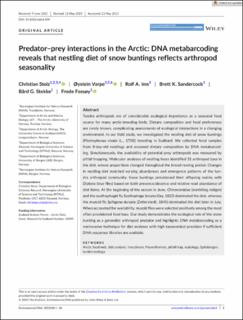Predator–prey interactions in the Arctic: DNA metabarcoding reveals that nestling diet of snow buntings reflects arthropod seasonality
Stolz, Christian; Varpe, Øystein; Ims, Rolf Anker; Sandercock, Brett Kevin; Stokke, Bård Gunnar; Fossøy, Frode
Journal article, Peer reviewed
Published version

Åpne
Permanent lenke
https://hdl.handle.net/11250/3083861Utgivelsesdato
2023Metadata
Vis full innførselSamlinger
- Department of Biological Sciences [2216]
- Registrations from Cristin [9489]
Sammendrag
Tundra arthropods are of considerable ecological importance as a seasonal food source for many arctic-breeding birds. Dietary composition and food preferences are rarely known, complicating assessments of ecological interactions in a changing environment. In our field study, we investigated the nestling diet of snow buntings (Plectrophenax nivalis (L., 1758)) breeding in Svalbard. We collected fecal samples from 8-day-old nestlings and assessed dietary composition by DNA metabarcoding. Simultaneously, the availability of potential prey arthropods was measured by pitfall trapping. Molecular analyses of nestling feces identified 31 arthropod taxa in the diet, whose proportions changed throughout the brood-rearing period. Changes in nestling diet matched varying abundances and emergence patterns of the tundra arthropod community. Snow buntings provisioned their offspring mainly with Diptera (true flies) based on both presence/absence and relative read abundance of diet items. At the beginning of the season in June, Chironomidae (nonbiting midges) and the scathophagid fly Scathophaga furcata (Say, 1823) dominated the diet, whereas the muscid fly Spilogona dorsata (Zetterstedt, 1845) dominated the diet later in July. When accounted for availability, muscid flies were selected positively among the most often provisioned food taxa. Our study demonstrates the ecological role of the snow bunting as a generalist arthropod predator and highlights DNA metabarcoding as a noninvasive technique for diet analyses with high taxonomical precision if sufficient DNA-sequence libraries are available.
